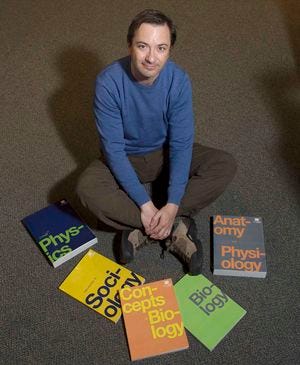Open Textbooks Advocate Circles Back To TechOpen Textbooks Advocate Circles Back To Tech
Rice University electrical and computer engineering professor Richard Baraniuk helped create OpenStax online series to solve a practical need for a good textbook.


12 Open Educational Resources: From Khan to MIT
12 Open Educational Resources: From Khan to MIT(click image for larger view and for slideshow)
Until recently, the thing Rice University's Richard G. Baraniuk has become best known for, promoting the spread of open educational resources, has had little to do with his day job, working on math-intensive challenges in electrical and computer engineering.
As a young professor frustrated that there was no good textbook for his course, Baraniuk decided that rather than create a textbook under a traditional publishing model, it would make more sense to create an open-source, web-based product that could benefit from community contributions and more easily be updated to keep pace with the rate of technological change. Taking his inspiration from successful open-source software products like Linux, he also thought that educational content should be organized into discrete modules that could be mixed and remixed, just as core modules and a variety of add-ons make up the different distributions of Linux.
The result of these musings was Connexions, a repository of course modules made freely available for educational use created in 1999. The most recent variation is OpenStax College, a series of complete, open licensed college textbooks that an instructor can use as is or modify and remix using the tools in Connexions. The first OpenStax books appeared in 2012, and Rice estimates they've saved students $3.7 million in the past year.
[ How open is open? Read Udacity Hedges On Open Licensing For MOOCs. ]
Baraniuk oversees both projects, and his passion for promoting open educational resources (OERs) earned him a 2006 TED Talk speaking slot. More recently, he published a treatise on the value of open education in the National Academy of Engineering journal, The Bridge. He was a participant in and organizer of an OER panel discussion I moderated recently at the Distance Teaching & Learning Conference at the University of Wisconsin.
Until the advent of OpenStax Tutor, a learning analytics software project and cloud service, Baraniuk's specific technical talents had little overlap with his OER work.
Connexions is less like an advanced technology venture than a Web publishing operation, although it does run on a custom-content management system, Rhaptos. Available as open-source software, Rhaptos organizes XML or HTML5 chunks of content in a way that supports easy remixing and output to a variety of formats, including PDFs and e-books. "None of this has anything to do with my day job," Baraniuk said.

Richard Baraniuk
Richard Baraniuk with print editions of the first five OpenStax books. Photo: Jeff Fitlow/Rice University
However, machine learning and collaborative filtering are among the "day job" disciplines he is starting to bring to bear on a software venture related to OpenStax, where the goal is "personalization and customization of the content not just at the class level but down to the individual."
"Most of my research is fairly theoretical," Baraniuk added, meaning that it's more about math than specific applications. "I started out wanting to be a 'real' engineer, but I wound up falling in love with math." Yet the math that he works on factors into technologies such as signal processing and machine learning, which in turn has given him an opportunity to close the circle on the two areas of enthusiasm and expertise.
OpenStax Tutor tackles what he says ought to be a nearly impossible problem: Analyzing a mass of student responses to tests and assessments and from that data inferring the concepts students are having trouble understanding.
But thanks to a "whole new branch of mathematics" developed at Rice and elsewhere, the problem turns out to be solvable, Baraniuk said. His approach is to take advantage of "compressive sensing" algorithms originally developed for use in technologies like radar. His research team calls its methodology SPARFA, short for Sparse Factor Analysis, a technique that can be applied to learning and content analytics. You can see a video lecture in which he explains it in detail, from the Personalized Learning Workshop held in April at Rice.
Using SPARFA, OpenStax Tutor is able to translate a bunch of student scores into what's known as a knowledge network -- which can be graphed as clusters of connected network nodes -- showing the gaps in a student's knowledge. In most adaptive software produced to date, these knowledge networks are created manually by teams of experts, but OpenStax Tutor automates the process.
In its current beta form, OpenStax Tutor is being tested as an online homework system in courses offered at Rice, Georgia Tech and the University of Texas El Paso, with smaller tests at Duke University and University of North Carolina Chapel Hill that are starting to ramp up. The project incorporates cognitive science research from Duke on productive patterns of learning, and Duke is also working to measure results from the project.
"We're able to get anywhere from one half to one letter grade improvement in outcomes," Baraniuk said, and it's an approach that can be applied to any course where students do homework or practice skills in a form that can be assessed online. The current software is not fully personalized to allow each student to follow an individual learning path, but that will be part of the next phase of research, he said.
Rice offers OpenStax Tutor for free, while reserving the right to charge for it as a cloud service if institutions adopt it at scale. Baraniuk said he is not sure whether the service will endure as a distinct product, even though one potential use would be to serve as the online homework system to accompany OpenStax textbooks, making them more competitive with commercial textbooks that come bundled with online tools. OpenStax Tutor could wind up being more significant as a research project that will inform the development of commercial adaptive learning software and homework systems, he said.
If the impact on the quality of education is positive, Baraniuk will be happy. While his formal training was an engineer, not an educator, he takes his teaching responsibilities seriously. He is pleased to see these two parts of his life coming together.
"I love teaching, and I just kind of fell into some kind of perfect career," he said.
Follow David F. Carr at @davidfcarr or Google+, along with @IWKEducation.
About the Author
You May Also Like






